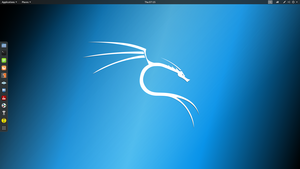 Kali Linux is a Debian-derived Linux distribution designed for digital forensics and penetration testing. It is maintained and funded by Offensive Security.
Kali Linux is a Debian-derived Linux distribution designed for digital forensics and penetration testing. It is maintained and funded by Offensive Security.Development
Kali Linux has over 600 pre-installed penetration-testing programs, including Armitage (a graphical cyber attack management tool), Nmap (a port scanner), Wireshark (a packet analyzer), John the Ripper (a password cracker), Aircrack-ng (a software suite for penetration-testing wireless LANs), Burp suite and OWASP ZAP web application security scanners.
It was developed by Mati Aharoni and Devon Kearns of Offensive Security through the rewrite of BackTrack, their previous information security testing Linux distribution based on Knoppix, originally it was designed with a focus on kernel auditing, from which it got its name Kernel Auditing Linux. The name is sometimes incorrectly assumed to come from Kali the Hindu goddess, or the Hindu demon. The third core developer, Raphaël Hertzog, joined them as a Debian expert.
Kali Linux is based on the Debian Testing branch. Most packages Kali uses are imported from the Debian repositories.
Kali Linux's popularity grew when it was featured in multiple episodes of the TV series Mr. Robot. Tools highlighted in the show and provided by Kali Linux include Bluesniff, Bluetooth Scanner (btscanner), John the Ripper, Metasploit Framework, Nmap, Shellshock, and Wget.
With version 2019.4 in November 2019, the default user interface was switched from GNOME to Xfce, with a GNOME version still available.
Requirements
- Kali Linux requires a minimum of 3GB hard disk space for installation.
- A minimum of 256MB RAM for i386 and AMD64 architectures.
- A bootable CD-DVD drive or a USB stick.
Recommended
The recommended hardware specification for the smooth run is:
- 10 GB of hard disk space, SSD preferred
- At least 2048 MB of RAM



0 Comments